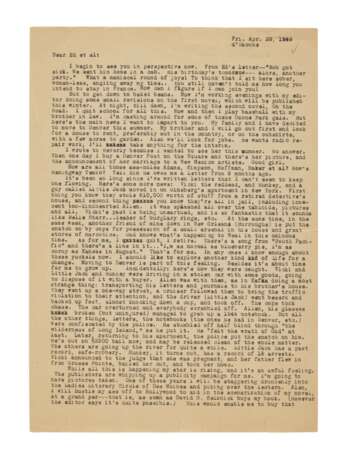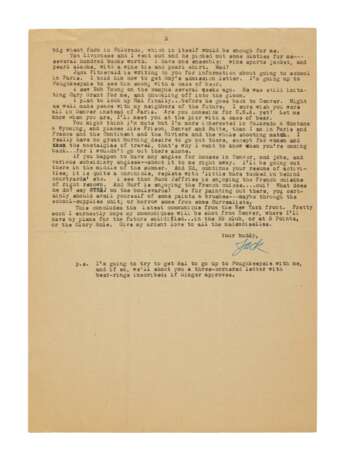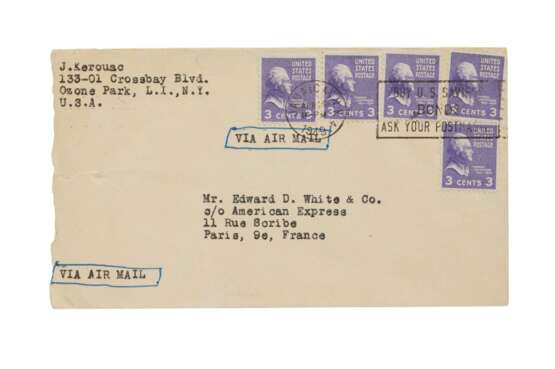Kerouac, Jack | Typed letter signed to Ed White; "at night, till dawn, I'm writing the second novel, On the Road"
08.12.2023 12:00UTC -05:00
Classic
Prix de départ
7000USD $ 7 000
| Auctioneer | Sotheby´s |
|---|---|
| Lieu de l'événement | Etats-Unis, New York |
Archive
La vente aux enchères est terminée. Vous ne pouvez plus enchérir.

ID 1108764
Lot 45 | Kerouac, Jack | Typed letter signed to Ed White; "at night, till dawn, I'm writing the second novel, On the Road"
Valeur estimée
$ 7 000 – 10 000
Typed letter signed ("Jack") to Ed White in Paris, on writing, the newfound attention it has generated, his fellow Beats, and Denver
1 1/2 pages (307 x 215 mm) on poor quality tan paper, [Ozone Park], 29 April 1949, original typed envelope with Jamaica, NY postmark; leaf toned with some closed marginal tears
Kerouac on the verge of fame.
Kerouac writes to Ed in France as he edits fervently his novels The Town and the City and On the Road, somewhat isolated from his fellow Beats in body and in spirit and distinctly restless, "I should like to explore another kind of life for a change." Allan Ginsberg's run in with the law earlier that year as well as Burroughs similarly being "put the snatch on" in New Orleans has left Kerouac wanting to leave them all behind ("I quit, I retire") and to move to Denver.
Kerouac begins by painting a picture of his current solitary existence—"I quit school for all this." In the evening he polishes The Town and the City with his editor, then "at night, till dawn, I'm writing the second novel, On the Road." Aside from playing baseball with his brother-in-law, he has apparently not been writing letters or seeing the fellow Beats.
Following this, he relates Ginsberg's notorious arrest. Having discovered that his roommates in New York, Vicki, Hunkey and Little Jack, had criminal tendencies, Ginsberg found his apartment filled with stolen property ("they stole $10,000 worth of stuff from a retired detective's house"). Fearing being busted by the police and them consequently discovering his diaries and papers which detailed his homosexuality, Ginsberg chose to do a "strange thing": riding with them in a stolen car in order to move the looted goods to Little Jack's mother's place, and to move his papers to his brother's house. The car found the attention of the cops, and Little Jack "went berserk" and sped off, eventually crashing and rolling it. Ginsberg lost his glasses and "stumbled off half blind through "the wilderness of Long Island," as he put it." He was arrested but released on bail; the other three were investigated, found to have extensive criminal histories, and charged.
Kerouac expresses an exasperation about Ginsberg and Burroughs's arrests and desires distance from them, "...it's about time for me to grow up." This could be connected to a growing anxiety about his increasing fame; "While all this is happening my star is rising, and it's an awful feeling."
As in lot 43, the direct monetary returns of his fame are one of the predominant attractions to it—if David O. Selznick buys his book, he can buy the farm in Colorado that he wants. Indeed, a whimsical dreamy picture of Denver and his idealized life there is oft expressed: he wants to get in touch with his "neighbors of the future" in Denver, and states, "I sure wish you were all in Denver instead of Paris," and "Pretty soon I earnestly hope my communiques will be shot from Denver, where I'll have my plans for the future solidified." Further, he champions it above Europe, despite being a fervent Francophile and expressing a strong desire to visit France in lots 43 and 47,—
"You might think I'm nuts but I'm more interested in Colorado & Montana & Wyoming [...] than I am in Paris and France and the Continent and the Riviera and the whole shooting match."
As it turns out, Kerouac did move to Denver and rented a small cabin alone to write. However, he found the experience desperately lonely, as detailed in mournful letters to Ginsberg at the time. He wrote "Down in Denver, down in Denver / All I did was die." He was supposed to stay out there a year, but came back after two months. Kerouac's restlessness and desire for a superior life often left him in this perpetual state reminiscent of Tantalus: never satisfied, always wanting.
A fascinating insight into Kerouac's psyche.
| Artiste: | Jack Kerouac (1922 - 1969) |
|---|---|
| Catégorie maison de vente aux enchères: | Impressions, graphiques, livres |
| Artiste: | Jack Kerouac (1922 - 1969) |
|---|---|
| Catégorie maison de vente aux enchères: | Impressions, graphiques, livres |
| Adresse de l'enchère |
Sotheby´s 1334 York Avenue 10021 New York Etats-Unis | ||||||||||||||
|---|---|---|---|---|---|---|---|---|---|---|---|---|---|---|---|
| Aperçu |
| ||||||||||||||
| Téléphone | +1 212 606 7000 | ||||||||||||||
| Conditions d'utilisation | Conditions d'utilisation | ||||||||||||||
| Heures d'ouverture | Heures d'ouverture
|












